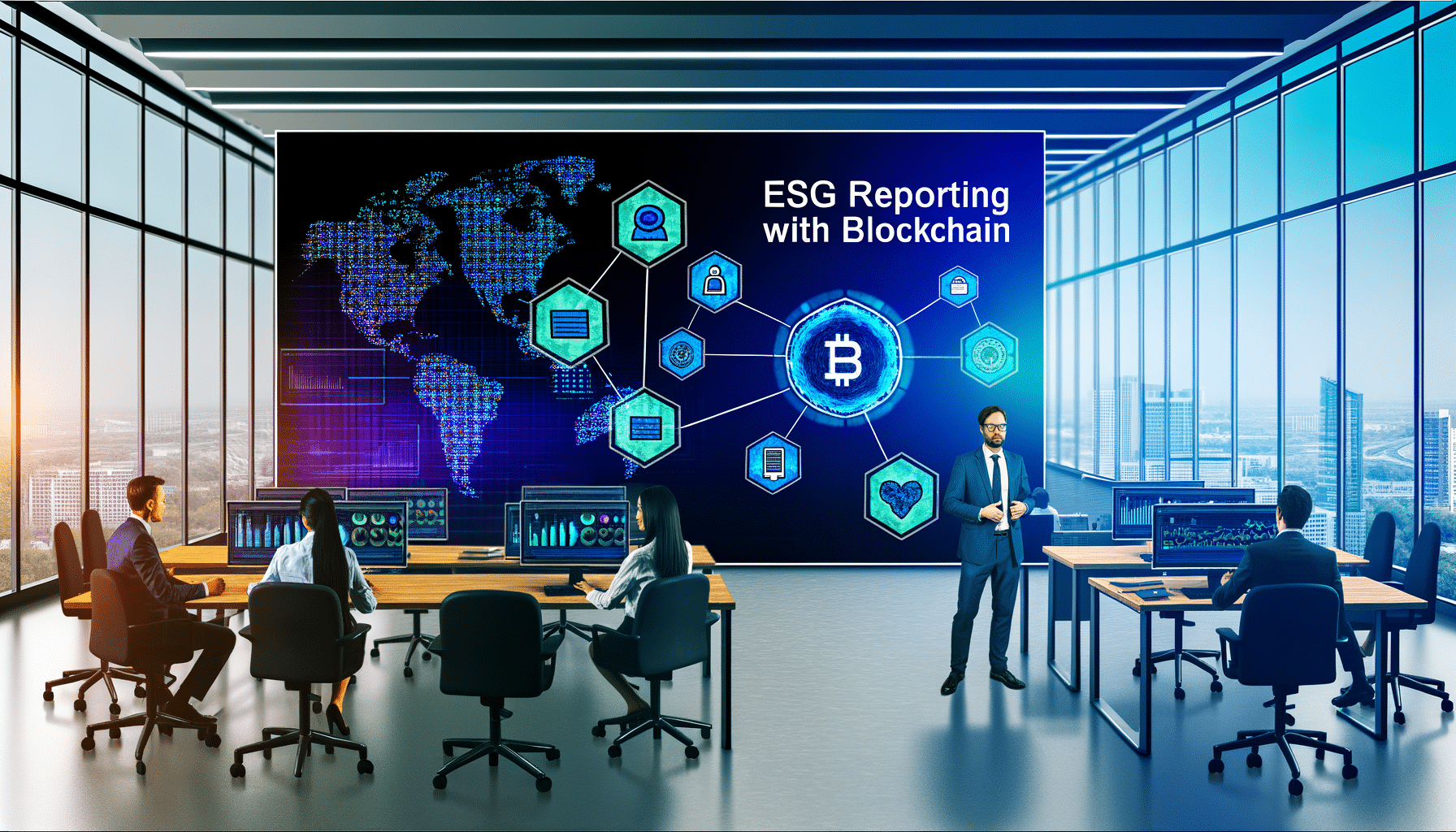- Sustainability
- November 16, 2024
ESG Reporting Simplified with Blockchain

Introduction
In the rapidly evolving landscape of business, sustainability has emerged as a cornerstone of strategic interests. Environmental, Social, and Governance (ESG) reporting is no longer a peripheral concern but a central element of how businesses evaluate risk and showcase their long-term strategic interests. Yet, implementing and managing comprehensive ESG frameworks can often seem like a daunting task. As someone who thrives on innovation, I am excited to share how blockchain technology can transform ESG reporting into a streamlined, transparent process.
The Intersection of ESG and Blockchain
ESG reporting typically involves navigating vast amounts of data, which can often be riddled with inefficiencies and inconsistencies. Here’s where blockchain comes to the rescue. Blockchain acts as a decentralized ledger, recording data across several nodes, making it almost impervious to alteration. This technology ensures that once data is recorded, it remains secure and verifiable. Applying this framework to ESG reporting can revolutionize how stakeholders view transparency and authenticity in sustainability narratives.
Breaking Down the Process with Blockchain
Enhanced Data Integrity and Trust
Integrating blockchain in ESG reporting nurtures a new level of trust and integrity. Data, once uploaded to the blockchain, is immutable, meaning it cannot be easily altered or falsified. This assures investors and stakeholders that the information they’re accessing is both reliable and accurate. The records are perpetual, providing an audit trail back to the original input, making compliance and verification a straightforward process.
Automating Compliance and Reporting
Blockchain’s smart contracts—a set of rules encoded on the blockchain that execute once predetermined conditions are met—can drive automation within ESG compliance. They streamline processes, such as data verification, compliance checks, and automatic alerts for discrepancies, which can significantly reduce the time and effort required for manual oversight. Imagine a scenario where energy consumption data from smart meters is automatically validated and uploaded to a blockchain ledger. The whole process occurs without manual intervention, providing timely, accurate insights for ESG reporting.
Expanding ESG Data Accessibility
With blockchain, ESG reporting becomes more transparent and accessible. All stakeholders, from financial analysts to regulatory boards, can access the same set of unaltered data with ease. This democratization of information ensures that all parties view consistent and authentic reports, reinforcing organizational accountability.
Implementing Blockchain for ESG Reporting
While the idea of integrating blockchain into existing systems might seem complex, the reality is more straightforward than you’d imagine. Many platforms, including RecordsKeeper.AI, are already designed to support a seamless transition. Begin by digitizing your ESG metrics. Then, map out which parts of your process will benefit most from blockchain—possibly starting with the data that requires the highest level of verification or those that demand intensive manual oversight.
Real-World Applications and Successes
Some leading organizations have already started harnessing blockchain to enhance their ESG reporting. Companies in the energy sector, for example, are using blockchain to track renewable energy sources and their distribution, ensuring compliance with international standards and reinforcing their commitment to sustainability. These examples serve as practical illustrations of how ESG goals are attainable with systematically executed technology adoption.
Conclusion
Integrating blockchain into ESG reporting is more than a trend; it is a revolution in how companies can commit to and communicate their sustainability efforts. At RecordsKeeper.AI, we’ve incorporated blockchain to seamlessly transform record management into a strategic advantage, boosting transparency, compliance, and efficiency. Whether it’s the assurance of true data integrity or the automation of compliance processes, blockchain is poised to elevate organizational ESG credentials to new heights.
As I delve deeper into the realms of blockchain and AI, I’m energized by the potential transformations these technologies bring, not just for ESG reporting but across myriad spheres. I invite you to stay connected with me for more insights and explore how technologies like RecordsKeeper.AI can augment your organizational strategies and operations. Together, we’ll pave the way for a more transparent and sustainable future.
Toshendra Sharma is the visionary founder and CEO of RecordsKeeper.AI, spearheading the fusion of AI and blockchain to redefine enterprise record management. With a groundbreaking approach to solving complex business challenges, Toshendra combines deep expertise in blockchain and artificial intelligence with an acute understanding of enterprise compliance and security needs.
Related Posts
Blockchain for Tracking ESG Initiatives
Monitoring and verifying ESG initiatives through blockchain technology.
- November 16, 2024

Blockchain-Based Energy Compliance Record Systems
Ensuring transparency in energy sector compliance with blockchain.
- November 16, 2024
Archives
- December 2024
- November 2024
- October 2024
- September 2024
- August 2024
- July 2024
- June 2024
- May 2024
- April 2024
- March 2024
- February 2024
- January 2024
- December 2023
- November 2023
- October 2023
- September 2023
- August 2023
- July 2023
- June 2023
- May 2023
- April 2023
- March 2023
- February 2023
- January 2023
- December 2022
- November 2022
- October 2022
- September 2022
- March 2019
Want to get more content like this?
Signup to directly get this type of content to your inbox!!
Latest Post
Organizing External Auditor Access
- December 22, 2024
Document Control in Manufacturing Plants
- December 21, 2024
Handling Rush Financial Report Requests
- December 20, 2024
Managing Record Access After Staff Changes
- December 19, 2024





